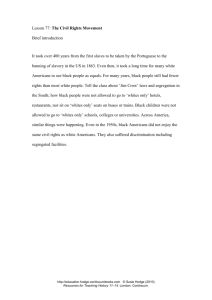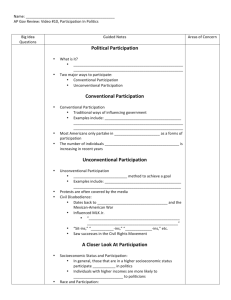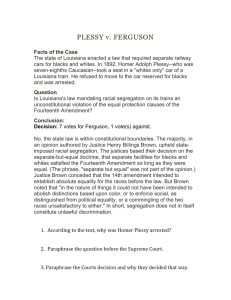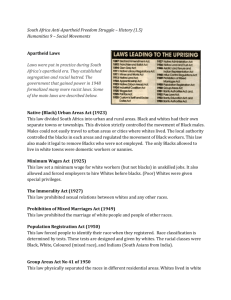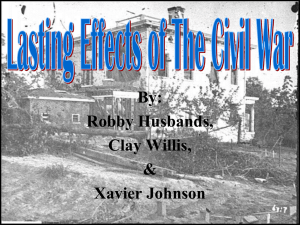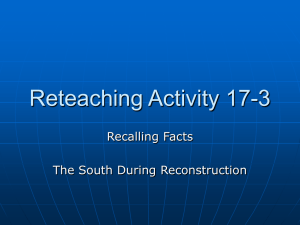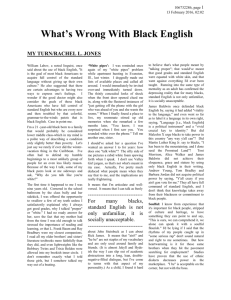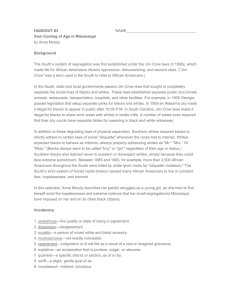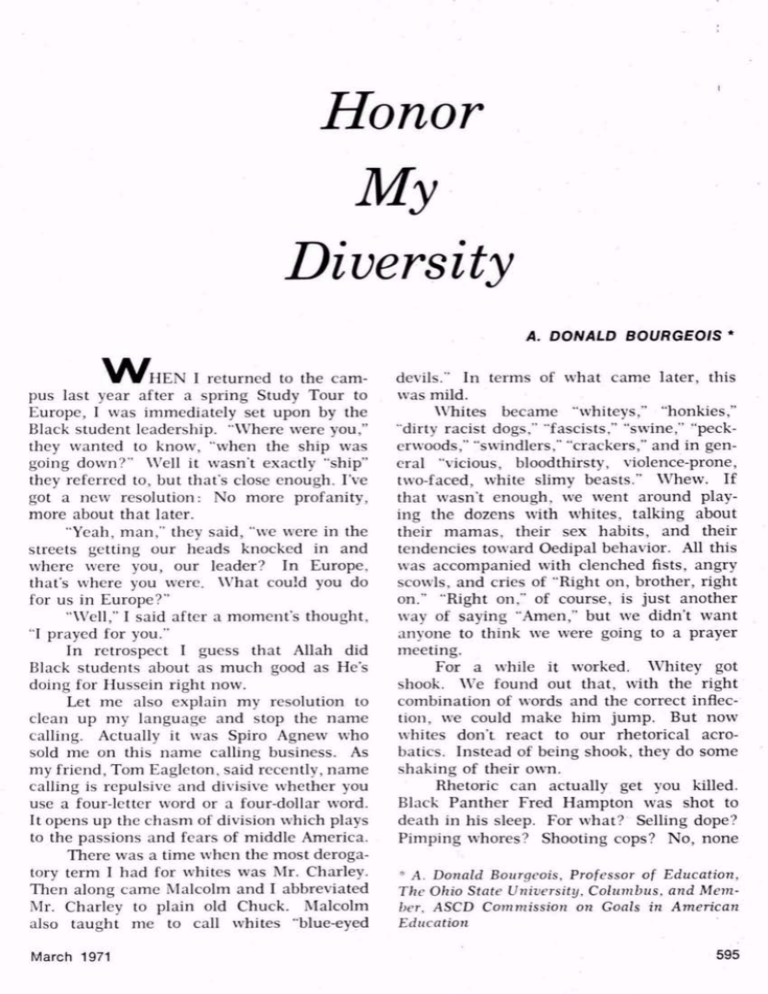
Honor
My
Diversity
A. DONALD BOURGEOIS *
HEN I returned to the cam
pus last year after a spring Study Tour to
Europe, I was immediately set upon by the
Black student leadership. "Where were you,"
they wanted to know, "when the ship was
going down?" Well it wasn't exactly "ship"
they referred to, but that's close enough. I've
got a new resolution: No more profanity,
more about that later.
"Yeah, man," they said, "we were in the
streets getting our heads knocked in and
where were you, our leader? In Europe,
that's where you were. What could you do
for us in Europe?"
"Well," I said after a moment's thought,
"I prayed for you."
In retrospect I guess that Allah did
Black students about as much good as He's
doing for Hussein right now.
Let me also explain my resolution to
clean up my language and stop the name
calling. Actually it was Spiro Agnew who
sold me on this name calling business. As
my friend, Tom Eagleton, said recently, name
calling is repulsive and divisive whether you
use a four-letter word or a four-dollar word.
It opens up the chasm of division which plays
to the passions and fears of middle America.
There was a time when the most deroga
tory term I had for whites was Mr. Charley.
Then along came Malcolm and I abbreviated
Mr. Charley to plain old Chuck. Malcolm
also taught me to call whites "blue-eyed
March 1971
devils." In terms of what came later, this
was mild.
Whites became "whiteys," "honkies,"
"dirty racist dogs," "fascists," "swine," "peckerwoods," "swindlers," "crackers," and in gen
eral "vicious, bloodthirsty, violence-prone,
two-faced, white slimy beasts." Whew. If
that wasn't enough, we went around play
ing the dozens with whites, talking about
their mamas, their sex habits, and their
tendencies toward Oedipal behavior. All this
was accompanied with clenched fists, angry
scowls, and cries of "Right on, brother, right
on." "Right on," of course, is just another
way of saying "Amen," but we didn't want
anyone to think we were going to a prayer
meeting.
For a while it worked. Whitey got
shook. We found out that, with the right
combination of words and the correct inflec
tion, we could make him jump. But now
whites don't react to our rhetorical acro
batics. Instead of being shook, they do some
shaking of their own.
Rhetoric can actually get you killed.
Black Panther Fred Hampton was shot to
death in his sleep. For what? Selling dope?
Pimping whores? Shooting cops? No, none
* A . Donald Bourgeois, Professor of Education,
The Ohio State University, Columbus, and Mem
ber, ASCD Commission on Goals in American
Education
595
of these. Brother Fred died the violent death
of a revolutionary, and you might even say
that Brother Fred died a natural death. It
was rhetoric that killed Fred Hampton. Fred
Hampton ran breakfast programs and other
community organization efforts. He had yet
to commit a violent act when at the age of 21
he was shot to death in his sleep.
Whites generally don't react with vio
lence to the black rhetoric (even though such
a predisposition might exist). No, most
whites just yawn. It's not even newsworthy
anymore. Time was when I could make the
six o'clock news with the right kinds of name
calling. But no more. And I'm sure Spiro
is going to discover the same thing for him
self. America just doesn't respond too long
to this approach. We will listen for a while.
Even laugh or cry for a while. Get happy
or feel sad, get angry and be mad for a while.
But it's never for more than a while.
Accepting the Unwanted Truth
Someone once said that Winston
Churchill's genius lay in recognizing the
obvious, no matter how distasteful. You say
that's not genius. Listen. The distasteful
turns you off and the obvious is too plain, too
easy. It was hard for me to accept the
obvious and distasteful concerning Blacks on
my campus. I remember when Martin Luther
King was assassinated. We were in Saint
Louis at the time. I worked for Al Cervantes,
the mayor. My daughter, Yolande, was at
Rosati-Kain, an all girls' parochial high
school.
At the memorial service conducted at
Saint Louis Cathedral, I was the lector. As
a matter of fact, all of the participants in the
Mass were Black at the special request of
the archbishop. At Yo Yo's school, a special
assembly featured my daughter as the
speaker. Needless to say, while lectors were
in regular usage at the cathedral and student
speakers were in vogue at Rosati, my daugh
ter and I were both having unique experi
ences.
I carried off my presentation without
incident. It's hard to ad lib the scriptures.
But Yo decided to tell it as she saw it. The
596
only Black in her class and one of only three
in the entire school, she detailed in her talk
the slights she had suffered during her time
at the school and how no Black had thereto
fore participated in an assembly.
After she finished, a nun walked up to
her and said, "Yolande, I never realized you
were so paranoid. How could you carry all
that venom around inside you, smiling at
your teachers and your classmates, all the
while feeling that they were doing you in?"
That night Yolande and I agreed that
this business of telling whites about their
ethical concessions was a minus sum game.
If you don't get understood, you lose because
stereotypical images block the communica
tion process. If you do get understood, you
still lose because you're paranoid. We also
decided that what would pass for paranoia in
the white community was really superior
awareness in the Black community. You're
not really paranoid if people are out to get
you.
What Is a Man?
Recognizing the obvious was a bit much
for me and my daughter. It was too distaste
ful. It was a bit much when I arrived at
Ohio State two years ago. One incident stands
out. During my first days here, a janitor
called me "boy" in the course of our other
wise friendly conversation. It was before my
days of rhetorical violence so he was spared.
But it led me to the question:
What is a man?
The male species of Homo sapiens over
the age of 21?
A powerful male individual who con
trols others?
Someone clothed in trappings of a man?
It's much easier to say who i s a man,
isn't it?
Just saying you're a man doesn't make
you a man, does it? When the garbagemen
in Memphis first put on the sandwich board
signs that proclaimed, "I am a Man," I
thought to myself that should say, "I want
to be a man." When they marched after the
assassination, in the face of hostility and
Educational Leadership
violence, with the same signs, I said, "Yes,
you are a man."
Or just looking like a man doesn't make
you a man, does it? You remember the story
of Daniel and the head eunuch who tried to
get Daniel to give up being a Jew. He offered
Daniel a new name, but Daniel said, "No,
I'll stay who I am." Now the eunuch looked
powerful on the outside, but if you stripped
him of his outer trappings you would find
that in one essential he was deficient. He
could never celebrate Father's Day.
The official policy of the U.S. govern
ment has been and is that Blackness and
manhood are antithetical. In other words,
you cannot be a man if you are Black.
The Moynihan report stereotyped the
Black family as matriarchal and weak. The
report said we needed more poppas. Rather
than deal with the real social problems
housing, income, police protection we were
told to go out and round up some more pop
pas. I've got news for Moynihan: if we all
had the best daddies in the world, the social
problems would still exist. Moynihan was
duped and deceived by his own stereotype.
He was duped into thinking that the plastic,
smiling, white suburban families were the
norm. We were deceived and duped also.
Didn't we rejoice when the government gave
us programs based on this myth, this stereo
type of Black families as weak, of Black men
as inadequate?
Head Start is a good example. The
rationale goes: If the Black family is weak,
let's take the children at an early age and
straighten them out. Head Start didn't prove
to be the panacea. At this rate, when the
original children in Head Start become par
ents, their children will be in Head Start.
Because we live in such a nation, a racist
nation, a nation of myths and stereotypes, we
need to examine manhood in terms of
Blackness.
We Didn't Dig Our Blackness
Once upon a time Black folks used to
do everything possible to "hide their nigger,"
according to comedian-activist Dick Gregory.
What he means, of course, is that we Blacks
March 1971
had a penchant for trying to be white. I
remember as a child using vaseline on my
hair when most of the country used it for
cuts, scratches, and bruises. I was literally
amazed later when I discovered its medicinal
use. For the first time, after having heard
this revelation from a friend, I went to the
medicine cabinet and read the label. Sure
enough, nothing about straightening naps,
only verbiage about cuts, scratches, and
bruises.
When I was 14, I graduated to Mur
ray's, a very stiff pomade with the picture of
a light brown-skinned, slick-haired dude on
the can. I yearned for a real "conk," which
had to be applied by a barber very meticu
lously because of possible burns from the
chemical used. The barber donned rubber
gloves and, using a wooden applicator, ap
plied the foamy, milky, lathery substance and
worked on the brother's head for what seemed
like hours. Finally, the customer would
emerge from the chair looking cool, baby,
really cool. The fear of the burns, plus the
fact that repeated use of the chemical turned
the user's hair a sickening, mariney colpr
inhibited me, so I settled for temporary
"conks" obtained by applying layer after layer
of Murray's interspersed with hot towel
applications.
Later when the "process" was invented,
the "conk" was almost universally abandoned
in favor of this chemical improvement.
Whereas the "conk" simply laid one's hair
down flat, so to speak, the "process" simu
lated the appearance of whites' hair, com
plete with appropriate waves, and then froze
the hair in place.
Everyone who made biweekly trips to
the barber for a "process" or the earlier "conk"
owned a "do-rag" which was worn during
sleep.
Later, the "do-rag" made its street
appearance, and dudes congregated on cor
ners sporting cloths tied tightly from the
crown to the forehead with a flap drawn
neatly across the top, the whole business tied
in a snappy knot or bow just above the eye
brows. Lord help you if you called somebody
a sissy just because he had on his "do-rag."
You would have to fight. That was worse
597
than signifying, which itself was dangerous:
signifying was worse than lying.
My sister, meanwhile, was getting her
hair straightened on a regular basis. I
thought her hair was beautiful in its natural
state. It was reddish-brown, sort of auburn.
Her eyes were the same color. Everyone
would comment on the hair, skin, and eye
color similarity. Yet every Sunday morning,
there she was in the dining room, pouting
and complaining as mama wielded that hot
iron through her transformed tresses.
My mother, on the other hand, kept the
Noxema and Nadinola people in business
with her abundant usage of their "bleaching"
cream. I never noticed her turn any shade
lighter, but I soon learned that Black people
with any sense avoided overexposure to the
sun, sun lamps, or any other such foolishness
that made one darker than he already was.
Thus her use of the cream was completely
acceptable.
My father was fair yellow, we called
him. His hair was straight and his features
keen. He could easily have joined the 12
million Blacks who have crossed the color
line.
Papere had a white buddy by the name
of Angelletti, and together they'd tour the
Loop bars after a night's work at the Chicago
Post Office. I used to be fascinated by the
stories my father would tell after these es
capades. He was the fox, the hero who'd
dared enter the inner sanctum on an equal
basis, sit with the lions in his lion costume,
roar when they roared, and escape unharmed.
All of this to make my point: we just
didn't dig our Blackness.
We Quit Hiding Our Nigger
Aldous Huxley once observed that the
reason it is so difficult to train birds is that
their whole central nervous system is tied up
in one function, that of flying. On the over
night steamer from Helsinki to Stockholm a
dozen or so gulls followed us for hours. I
sat on the deck and observed these birds in
flight, understanding Huxley all the more
and understanding humans all the more.
American whites have been so intent on
598
being white that it has hung them up on
doing what is equitable or even perceiving
what is equitable. Being white means pro
tecting things, holding the line, being power
ful, being a man; or, rather, should I say
that being white meant thinking that there
were things that needed protecting, or
imagining there was a status quo line
or level below which one should never fall, or
hoping that one would be seen as powerful,
or pretending one was a man.
Since the ostensible form exuding
"power" and being "man" was the assaultive,
swaggering, outrageously offensive white,
Blacks began imitating this style. This imita
tion reinforced and supported the fantasy
world of white manhood. Mr. Charley's psy
chological hangups kept breaking through,
though. My soul sister whom he coveted and
took by coercion, whether the coercion was in
the form of a slaveowner, a trick, or the in
surance man, was the first to peep his hole
card. We began to perceive that we were the
"men," that when whitey was calling us boy
he was questioning his own manhood.
We became the stylists, the musical
stylists, the language stylists, the stylists of
social reform, the stylists of revolution, the
universal stylists. Here, all the time we had
been out imitating those fools when all the
time they have been imitating us. What an
awakening! When the dawning came, it was
the morning we had sung about which was
coming bye and bye. We did understand it
better.
The Black introspection established our
worth. We looked at ourselves and liked
what we saw. One of Newton's Laws of Mo
tion had proclaimed that bodies at rest tend
to remain at rest and bodies in motion tend to
remain in motion. We were the movers, we
were the backbone, we were the conscience,
we were the bodies in motion. While we were
painted as villains, we knew now we were
victims. From times when we mouthed our
own inferiority, we moved to times in which
we gloried in ourselves.
We quit hiding our nigger.
First thing I did was change my symbol.
Instead of a slave with rhythm, I became a
man with soul. Then I undirtied the word
Educational Leadership
black. The language I spoke had told me
about blackmail, black days, black hearts,
black everything that was dirty, while white
was clean and pure as the driven snow. (I
used to wonder why fields of cotton weren't
clean and pure until I realized that we were
usually in that picture.) Even a tornado is
as black as night until it goes in that white
lady's kitchen. Then it's a white tornado.
Power was the first thing I blackened.
Next thing was my history, my roots. Then
I went to work on myself.
Finally the job was complete.
I had become a Black, seeking powersharing and equity. I had a new sense of my
identity. I became proud of my heritage,
aware of my humanity. I knew I had a cer
tain something that nobody else had. I knew
I had soul. I understood that now I had a
culture of my own. I knew I was distinct.
I knew I was different. I always knew this,
only now I was proud of it. More than any of
this, I now knew that I was a man.
This self-knowledge was hard to come
by. I fought knowing myself. It was easier
being on the outside trying to get in. I knew
that if I knew myself and acknowledged my
culture as separate and beautiful I would
have something to protect, something to keep
others From destroying. The old way of
always trying to be white or to get to be part
of the "in crowd" was easier because some
how we knew we'd never make it.
I now know that we are unassimilable.
We won't melt in any pot. We arc diverse.
Whites Have Dishonored
My Diversity
Thclonious Monk once observed that
"Trouble is, too many folks going around
saying they're white." It's true, there are too
many folks thinking they're something be
cause they're white and pushing folks around
because that's how white folks are supposed
to behave. So it is only natural, I guess, that
whites have always dishonored my diversity.
They felt they were somebody, somebody
special.
This led another philosopher, Franz
Fanon, to the notion of dual liberation, that
March 1971
is, that whites must be freed of their su
periority even as Blacks are being freed of
their inferiority. What good would it do if
whites disdained their attitude of superiority
while I still felt myself a slave? Conversely,
what good is it doing in America today for
me to discard my old self-debasing notions
and continue to face an implacable foe who
believes and feels himself my superior? '
This duality, this twin liberation can be
accomplished as whites begin to honor my
diversity. Otherwise we as a nation can look
forward to more of the same, in true Stella
Dallas fashion. Remember the radio show
"Stella Dallas"? When I was a kid my mother
listened to it. I could miss six or nine months
of it, then happen to be home one day and
pick up where I left off. We've got a real
Stella Dallas syndrome operating. There's
always some program or movement getting
up, moving on, or getting out. I don't care if
it's abolitionists or reconstructionists or iritegrationists or separationists, it's all the same.
There's a change of names but it's still Stella
Dallas. Whether it's doing it for them or
letting them do it alone, it's still Stella Dallas.
It's still dishonoring my diversity. .
Roger D. Abrahams, in his book, Posi
tively Blacky tells us that we need to view
things, institutions, and events from our
point of Blackness with our Black eyes
rather than be observed from the point of
view of the thing, institution, or event.
For example, if I look at Blackness from
the point of view of Christianity, I find that
the white Christians are my keepers, are my
benefactors and my friends. But if I look
at Christianity from the point of view of
Blackness, I find that the white Christians
see themselves as born in the image of God
and see me as the devil.
Or, as Abrahams says, if I look at Black
ness from the point of view of America, I
find the promise of brotherhood, fraternity,
equality. I find an equilibrium model and
this deludes me, gives me a sense that we
are driving toward something at all times
social stability and social justice and that
we can therefore solve our own problems
1 Roger D. Abrahams. PositHv-Ui Black. Engle\vood Cliffs. New Jersey: Prentice-Hall, Inc., 1970.
599
through the principle of social incorporation,
that is, through making a place for everyone
in society.
Abrahams also points out that if I look
at America from the point of view of Blackness, I know that I need a disequilibrium
model to explain and confront those realities
and coercive forces which impede me. With
Black eyes, my expectations are not of social
persistence and stability but of change, not
of change by consensus but of change by
conflict and dissent.
If I look at Blackness from the point of
view of education, I find a formalized, monopolistic system designed to deblack me, to
crackerfy my mind and make me conform to
an alien culture. But if I look at education
from the point of view of Blackness, I find I
need a system that understands my vitality,
that recognizes me as a sensual being, more
hand than eye, and that helps me learn to
deal effectively with those forces which oppress me and keep my community weak.
H onor My Diversity
Up until recently we have been powerless little darkies, sometimes begging, sometimes yelling, "Help us, y'all."
But Blacks, having quit trying to "hide
their nigger," now dig their Blackness, respcct their own cultural past, glory in their
diversity.
We ask for one rule: Honor My
Diversity.
No other rules or commands. No more
civil rights laws. No more poverty programs,
No more do-gooders. No more books or
speeches by white experts. Just this one rule:
Honor My Diversity.
n
Hunters Point Redeveloped
A Sixth-Grade Venture
During the taut and tense days immediately following San Francisco's first racial
riot in October 1966, one classroom teacher, William Edison of Sheridan School, channeled
the energies and frustrations of his sixth-grade students into an exciting social studies
project. They undertook to plan the complete redevelopment of one of the city's depressed
areas, Hunters Point.
This unusual booklet includes a verbatim tape transcription of the students' pre
sentation of their plans to a class in elementary education at San Francisco State College.
Introductory statements are by FRED T. WILHELMS, ASCD Executive Secretary
"A Fresh Breath of Reality"; MARGARET BURK LAGRILLE, Professor of Education " 'Hunters
Point Redeveloped' and Teacher Education"; and WILLIAM EDISON, Classroom Teacher
"A Class for All Seasons."
The booklet is illustrated and features a full-color facsimile of the children's mural
showing Hunters Point "redeveloped."
68 pages
NEA Stock Number: 611-17348
$2.00
ASSOCIATION FOR SUPERVISION AND CURRICULUM DEVELOPMENT
1201 SIXTEENTH STREET, N.W., WASHINGTON, D.C. 20036
600
Educational Leadership
Copyright © 1971 by the Association for Supervision and Curriculum
Development. All rights reserved.

